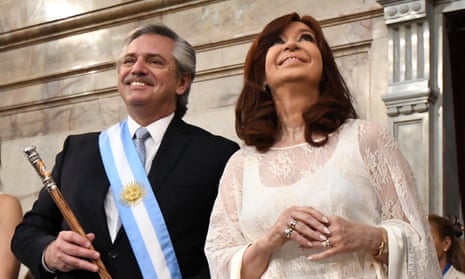Argentina’s Peronist leader, Alberto Fernández, has been sworn in as president, marking a shift to the left for Latin America’s third-largest economy as the country fights rampant inflation, credit default fears and rising poverty.
The 60-year-old center-left politician took his presidential oath on Tuesday in front of cheering lawmakers, political leaders from the region and representatives from major trade partners including Brazil and the United States.
In an hour-long speech, he criticized rising rates of hunger and poverty and said the country needed to revive growth to escape from “virtual default” after a period of painful austerity under the outgoing conservative Mauricio Macri.
“We have to heal so many open wounds in our homeland,” he said in the speech in Congress after he had symbolically taken the presidential baton and sash from Macri, whose administration was hit by recession and a spiraling debt crisis.
Fernández pledged to bridge social divisions and to roll out a “massive” credit system with low rates to bolster domestic demand.
“Without bread, there is no present or future. Without bread, life only suffers,” he said.
The rise of Fernández marks a return of Argentina’s powerful left-leaning Peronists, including the vice-president, Cristina Fernández de Kirchner, a rock-star populist politician who clashed with investors and farmers during her twin terms as president between 2007-2015.
In a move to underscore his man-of-the-people credentials, Fernández had driven himself in his silver Toyota to Congress, waving to crowds lined along the roadside.
In the historical Plaza de Mayo square in central Buenos Aires, supporters gathered opposite the Casa Rosada palace, waving banners and beating drums. T-shirts with the face of Fernández de Kirchner read “We’re back”.The new administration is expected to usher in growth-focused policies after unpopular fiscal tightening, which critics warn could strain already depleted state coffers.
Supporters hope Fernandez can tackle annual inflation running above 50%, poverty approaching 40% amid recession, and tricky restructuring talks over about $100bn in sovereign debt with lenders including the International Monetary Fund.
Fernández picked Martín Guzmán, a young disciple of the Nobel prize winner Joseph Stiglitz, to head the economy ministry last week.
“Alberto needs to improve the economic and social situation,” said Verónica Quintana, 34, selling flags in the central square. “There are many people who are hungry and it is a critical situation we are in.“
In a reflection of political challenges ahead, Brazil’s rightwing leader, Jair Bolsonaro, who has clashed publicly with Fernández, did not attend, the first time since 2002 a Brazilian president has not attended the inauguration in Buenos Aires.
Fernandez will need to balance varied demands of his broad Peronist coalition and pressure from Macri’s weakened, though still influential, party.
Political analyst Julio Burdman said this juggling act would be Fernández’s biggest challenge. “He needs to do a rapid maneuver to get the economy started again, which will all depend on how he is able to handle the debt.”
